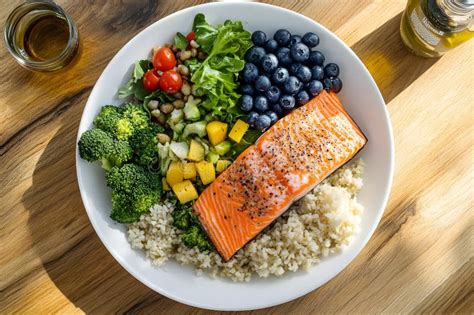How to optimize nutrition for sustained energy & mental focus all day?

Fueling Your Day: The Nutritional Blueprint for Peak Performance
In our demanding lives, the quest for sustained energy and unwavering mental focus is more critical than ever. While many factors influence these states, nutrition stands as a cornerstone, often underestimated. What you eat—and when you eat it—directly impacts your blood sugar levels, neurotransmitter production, and overall cellular function, dictating whether you experience a midday slump or remain sharp and energetic from morning till night. Optimizing your diet isn’t about restrictive eating; it’s about making informed choices that power your brain and body efficiently.

The Foundation: Balanced Macronutrients
Your body requires a consistent supply of macronutrients—carbohydrates, proteins, and fats—to function optimally. The key lies in choosing the right types and ratios.
- Complex Carbohydrates: Unlike simple sugars that provide a quick spike and subsequent crash, complex carbohydrates (like whole grains, oats, brown rice, quinoa, and vegetables) release glucose slowly into the bloodstream. This provides a steady, sustained energy source.
- Lean Proteins: Essential for building and repairing tissues, proteins also play a crucial role in producing neurotransmitters that affect mood, focus, and energy. Include sources like lean meats, fish, eggs, legumes, tofu, and Greek yogurt in your meals. Protein helps slow down the absorption of carbohydrates, further stabilizing blood sugar.
- Healthy Fats: Far from being the enemy, healthy fats (from avocados, nuts, seeds, olive oil, and fatty fish) are vital for brain health and hormone production. They provide a dense, long-lasting energy source and are crucial for the absorption of fat-soluble vitamins.
Stabilizing Blood Sugar: Avoiding the Crash
One of the biggest culprits behind energy dips and brain fog is unstable blood sugar. Eating sugary foods or refined carbs causes a rapid rise in blood glucose, followed by an equally rapid fall, leaving you feeling sluggish and unfocused.
Strategies to maintain stable blood sugar:
- Fiber-Rich Foods: Fiber, found abundantly in fruits, vegetables, whole grains, and legumes, slows down sugar absorption, preventing sharp spikes and crashes.
- Combine Macronutrients: Always pair carbohydrates with protein and/or healthy fats. For example, an apple (carb) with a handful of almonds (protein, fat) is better than an apple alone.
- Limit Added Sugars: Be mindful of hidden sugars in processed foods, drinks, and snacks. Opt for natural sweeteners or whole fruit instead.

Hydration: The Often-Overlooked Powerhouse
Even mild dehydration can significantly impair cognitive function, leading to fatigue, reduced concentration, and headaches. Your brain is largely composed of water, and its optimal function depends on adequate fluid intake.
- Drink Water Consistently: Don’t wait until you’re thirsty. Sip water throughout the day. Keep a water bottle handy as a visual reminder.
- Electrolytes Matter: For prolonged physical activity or in hot weather, consider incorporating electrolyte-rich foods (like bananas, spinach) or drinks to replenish lost minerals.

Micronutrients & Brain Health
While macronutrients provide the bulk of energy, micronutrients—vitamins and minerals—act as critical cofactors in countless metabolic processes, including energy production and neurotransmitter synthesis.
- B Vitamins: Essential for converting food into energy and for brain health. Find them in whole grains, leafy greens, eggs, and lean meats.
- Omega-3 Fatty Acids: Crucial for brain structure and function, reducing inflammation, and improving mood and cognitive performance. Rich sources include fatty fish (salmon, mackerel), flaxseeds, chia seeds, and walnuts.
- Antioxidants: Vitamins C and E, selenium, and zinc protect brain cells from oxidative damage. Found in colorful fruits, vegetables, nuts, and seeds.
- Iron: Essential for oxygen transport. Iron deficiency can lead to fatigue and impaired cognitive function. Lean red meat, spinach, and lentils are good sources.

Strategic Meal Timing & Snacking
The timing of your meals and snacks can be just as important as their content. Spreading your nutrient intake throughout the day can help maintain stable energy levels.
- Start Strong with Breakfast: A balanced breakfast sets the tone for your day, preventing early morning energy slumps.
- Smaller, More Frequent Meals: Instead of three large meals, consider 4-5 smaller meals or healthy snacks spread every 3-4 hours. This keeps your metabolism active and blood sugar stable.
- Smart Snacking: Choose snacks that combine protein, healthy fats, and complex carbs – e.g., Greek yogurt with berries, an apple with peanut butter, or a handful of nuts.

Conclusion: Your Personalized Energy Plan
Optimizing nutrition for sustained energy and mental focus is a journey of awareness and consistent effort. It involves prioritizing whole, unprocessed foods, balancing macronutrients, staying well-hydrated, and listening to your body’s signals. By making mindful dietary choices, you empower yourself to conquer your day with vitality and sharp cognitive function, leaving behind the dreaded energy slumps and brain fog. Experiment with these principles, find what works best for your unique body, and transform your daily performance.








